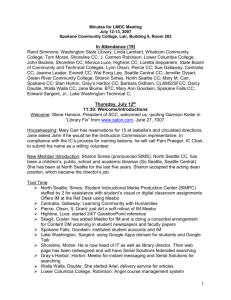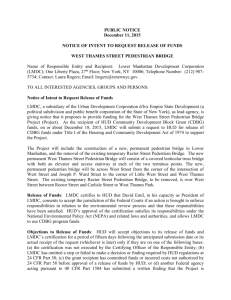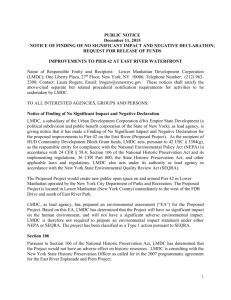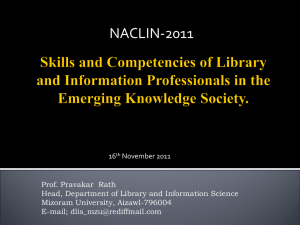LMDC strategic plan 2009-11
advertisement
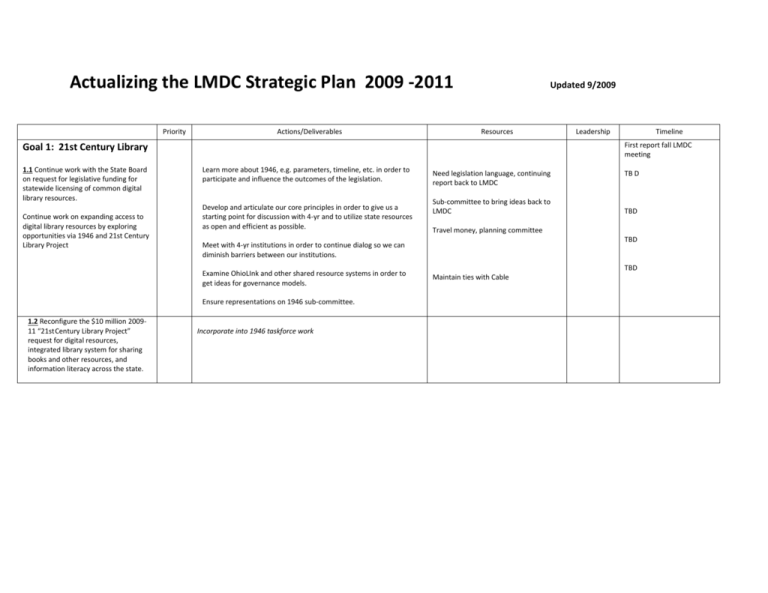
Actualizing the LMDC Strategic Plan 2009 -2011 Priority Actions/Deliverables Updated 9/2009 Resources Continue work on expanding access to digital library resources by exploring opportunities via 1946 and 21st Century Library Project Learn more about 1946, e.g. parameters, timeline, etc. in order to participate and influence the outcomes of the legislation. Develop and articulate our core principles in order to give us a starting point for discussion with 4-yr and to utilize state resources as open and efficient as possible. Need legislation language, continuing report back to LMDC Sub-committee to bring ideas back to LMDC Ensure representations on 1946 sub-committee. Incorporate into 1946 taskforce work TB D TBD Travel money, planning committee TBD Meet with 4-yr institutions in order to continue dialog so we can diminish barriers between our institutions. Examine OhioLInk and other shared resource systems in order to get ideas for governance models. 1.2 Reconfigure the $10 million 200911 “21st Century Library Project” request for digital resources, integrated library system for sharing books and other resources, and information literacy across the state. Timeline First report fall LMDC meeting Goal 1: 21st Century Library 1.1 Continue work with the State Board on request for legislative funding for statewide licensing of common digital library resources. Leadership TBD Maintain ties with Cable Goal 2: Marketing the Value of Libraries, Promoting Use, Information Competency as core learning outcome Priority Actions/Deliverables Resources 2.1 Develop common talking points that enable library directors to communicate to VP, President, and Chancellor LMDC’s mission and importance of participation by individual college library. Take advantage of the Big 6 model/language/campaign created through SCC to create a communication tool for the LMDC/CTCs. 2.2 Document and disseminate success in acquiring funding for information literacy (IL) work and achievements in integrating IL into the curriculum. Collect and share student persistence data for those students who receive IL instruction Develop a collection tool Collect information on IL assessment occurring across the state and nationally Collaborate with Planning &Effectiveness to collect data from state & national data repositories Create a strategic marketing plan with target audience identified and link to initiatives. Graphic designer, printing resources, ALA/ACRL marketing plan outline, Use interviews collected in step II and incorporate into marketing plan. Conduct a literature search for case studies and practices. Collect anecdotal information and interview students (video tape). 2.3 Representatives from LMDC and the state universities will continue to meet and work on Information Literacy outcomes for CTC graduates or the rising juniors. 2.4 Collaborate with CLAMS (College Librarians and Media Specialists of WA State) on mounting a statewide learning workshop or symposium on library resources for faculty. 2.5 Advocate for inclusion of IL as a core competency. Videographer, Storage and distribution Leadership Timeline Goal 3: LSTA Information Literacy Grant, Library as Instructional Leader Priority 3.1 Implement a new 4 year Information Literacy grant from the State Library. “Library as Instructional Leader: Transforming Pedagogy and Curriculum with Information Literacy.” This includes working more closely with discipline faculty, ABE-ESL in particular. 3.2 Participating libraries have been identified; workshop held; plans for summer workshop and research project underway. Actions/Deliverables Refer to Grant timeline Resources Leadership Timeline Goal 4: Funding, Fiscal Accountability Priority 4.1 Negotiate consortium prices for library resources through membership in Orbis Cascade Electronic Resources Program (ERP). Create guidelines or a structure that will govern LMDC consortial purchases. Actions/Deliverables Orbis Cascade membership in ERP Orbis. Not every library joined Orbis; why didn’t all? Price? Should we say that we finished the negotiations by everyone joining Orbis? Everyone has the opportunity to join. Should we provide funding for libraries who can’t afford to join Orbis so that all can join? Guidelines for consortial purchases: need a working group that will indentify a model for consortial purchases that includes everyone in LMDC. Will identify things like: Fiscal agent Ensure the consortium includes all LMDC libraries, not just subsets. However, the purchases may play out so that not everyone purchases all resources. How do we work as a group when we come from different funding models? Financial model that includes everyone but allows for some to pay less based on financial need and also lack of interested. Andrew is willing to work with a group on this; he’s already working with Will S. at state library, talking about a database summit. Do we have separate organization for database purchases? Bylaws? Expand group purchases to things like media (either streamed or even DVD’s). Negotiate prices. Some libraries are negotiating diecounts with individual companies (like insight). One possibility is to group ourselves by size. Include negotiations for regular updates (for materials such as nursing videos) Futuring work towards a database purchase future where we purchase as a system. Funds would be mingled For example, colleges could select 3 or 4 databases out of a group purchased by the system The fundamental idea is a core package. It’s clear to the vendor that we’re spending a substantial amount; gives us power to negotiate Resources Leadership Timeline Near Completion Priority 4.2 Provide virtual reference service 24X7 through membership in QuestionPoint. Actions/Deliverables Why hasn’t everyone joined? What are the barriers? Can we address them (Like taking more ref hours for libraries who don’t feel like they can do the ref hours). Will need a small committee to handle this Contact Ahniwa to see if he knows reasons for non-participating libraries. Contact individual libraries if necessary to find out barriers Suggest ways to address barriers. New goal: Assess effectiveness, reach to new population, staffing effects, influence on other services. Survey of participating libraries? Would Ahniwa have assessment tools we could tap into? One person could take leadership. 4.3 Identify non-legislative funding partners to provide 21st century library instruction, services and resources. Consider using LMDC funds to hire a grant writer. Local sources: Companies who are “friends” of the library. There are barriers. They are used to working with public libraries. Local foundation, which don’t think in terms of state-wide groups. Needs to happen within communities. Marketing. Talk to people who hire our graduates. *local leadership System Sources: Companies like Bank of America who are in all of our communities. Could be “friends” of the community college libraries. *Designated LMDC representatives, with full knowledge and authority. Considerations: Create a list of value-added info/talking paints for library directors. Look at what we’ve done as a group. Invest in us! Marketing and funding work together, can’t be done separately. Banks. We have community colleges in your communities. We educate your workers. Part of community. 4.4 Additional cooperative ventures Establish group to examine which are the next cooperative ventures. We want to demonstrate that we are making full use of our existing resources. o Federal searching as a group buy. Very expensive. Create a friend group, involve companies like banks. (goal is to get students to content within one or two clocks). o Illiad for ILL Resources Leadership Timeline Implementation started in Winter 2009. Goal 5: Seamless Integration and Delivery of library resources and services Priority Actions/Deliverables 5.1 Encourage system wide collaboration for marketing and maximizing use of library resources and services. 5.2 Engage in conversation on resource-based learning and textbook learning (whether traditional paper or open source). Consider hiring a speaker/facilitator for discussion. Actively participate in Gates Grant Resources Leadership Timeline

